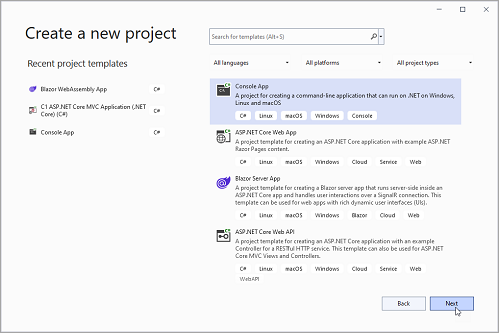The ADO.NET provider for provides a wide range of features that enable connectivity to CSV from .Net applications. The documentation will help you understand the C1.AdoNet.CSV namespace, which includes all the available classes that can be used to connect and retrieve data from a CSV file.
DataConnectors are mostly used in combination with other ComponentOne components, such as DataEngine and FlexPivot. The procedure below describes how to use the DataConnector in a console application within Visual Studio.
How to create a new Console Application
The ADO.NET provider for CSV can be used in any application. In this guide, a console application is created:
- Open Visual Studio.
- Select Create a new project from the Get started pane.
- In the Create a new project window, select Console Application and click Next, as in the screenshot below:

- In the Configure your new project window, write your project's name, choose location to save your project and click Create.
How to add the NuGet packages
- From the Project menu, select Manage NuGet Packages. The NuGet Package Manager appears.
- In the NuGet Package Manager, click the Package source drop down and select nuget.org
- In the left pane of the Browse tab, select C1.AdoNet.CSV
- In the right pane of the Browse tab, click Install to add the reference to the package.
How to use ADO.Net provider for CSV to retrieve data
Follow the steps provided below to learn and implement data retrieval using ADO.NET provider for CSV.
- Create a connection string to set up a connection to a local CSV resource by setting the Uri property.
C# コードのコピーstatic string csvConnectionString = $"Uri='sampleCSV.csv'";
- Fetch the data using C1CSVConnection class. The connection string using corresponding attributes is passed as an argument. For more information on creating connections, see Creating Connection.
C1CSVConnection implements the ADO.NET DbConnection, similar to standard ADO.NET connection object that retrieves a single result set of all the data that matches a query. Once the connection is established, it retrieves the data from the source as shown in the following code example.
C# コードのコピーstatic void ReadData() { Console.WriteLine("Query all Accounts..."); //データを取得します。 using(var con = new C1CSVConnection(csvConnectionString)) { con.Open(); var table = con.GetSchema("columns", new string[] { "sampleCSV" }); ShowDataTable(table); var cmd = con.CreateCommand(); //コマンドを提供します。 cmd.CommandText = "Select * From sampleCSV"; var reader = cmd.ExecuteReader(); } } //テーブルを表示します。 static void ShowDataTable(DataTable table, int length = 25) { foreach (DataColumn col in table.Columns) { Console.Write("{0,-" + length + "}", col.ColumnName); } Console.WriteLine(); foreach (DataRow row in table.Rows) { foreach (DataColumn col in table.Columns) { if (col.DataType.Equals(typeof(DateTime))) Console.Write("{0,-" + length + ":d}", row[col]); else if (col.DataType.Equals(typeof(decimal))) Console.Write("{0,-" + length + ":C}", row[col]); else Console.Write("{0,-" + length + "}", row[col]); } Console.WriteLine(); } }